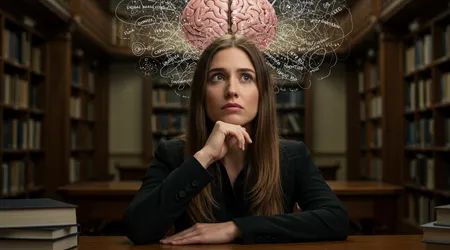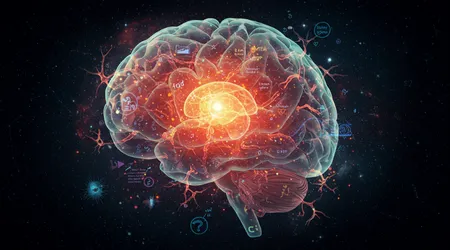Why the Brain Loves Conspiracy Theories

Brain Loves Conspiracy Theories it’s a phrase that captures a curious quirk of human psychology. In 2025, conspiracy theories thrive, from viral social media claims about AI overlords to whispers of global cover-ups.
Anúncios
They hook us, spark debates, and sometimes even shape elections. But why do our minds cling to these often unfounded narratives?
This deep dive explores the psychological mechanisms behind this fascination, weaving together cognitive science, social dynamics, and real-world examples.
We’ll uncover why the Brain Loves Conspiracy Theories, how it processes them, and what this reveals about our need for meaning in a chaotic world. Let’s unravel the mystery with fresh insights and a critical lens.
The Cognitive Pull of Pattern-Seeking
Our brains are wired to find patterns, a trait rooted in survival. Early humans who spotted a rustling bush as a potential predator lived longer.
Anúncios
This knack for connecting dots, called illusory pattern perception, drives the Brain Loves Conspiracy Theories.
When faced with random events like a global health crisis our minds seek causal links, even if none exist.
A 2020 study in European Journal of Social Psychology found a strong correlation between seeing patterns in random sequences and believing conspiracy theories. This isn’t just superstition; it’s a cognitive shortcut gone haywire.
This tendency thrives in uncertainty. When facts are scarce, the brain fills gaps with stories, often dramatic ones. Consider the 2020 COVID-19 pandemic: theories about lab leaks or microchip vaccines exploded online.
++ The Psychology Behind Going “No Contact” in Relationships
These weren’t just wild guesses; they were attempts to impose order on chaos. The Brain Loves Conspiracy Theories because they offer a narrative where randomness feels like a plot, giving us a false sense of control.
Yet, this pattern-seeking can mislead. The brain’s eagerness to find meaning sometimes ignores evidence, like when anti-vaccine conspiracies persisted despite overwhelming data on vaccine safety.
It’s like a detective piecing together a puzzle with missing pieces, inventing shapes to fit. This cognitive bias makes conspiracies seductive, even when they defy logic.

The Emotional Appeal of Secret Knowledge
Conspiracy theories aren’t just intellectual exercises; they’re emotional magnets. The Brain Loves Conspiracy Theories because they promise exclusive insights, making believers feel special.
Social psychologist Roland Imhoff’s research shows that smaller, niche theories like those about shadowy cabals appeal to those craving uniqueness. It’s a psychological boost, like being the only one in a room who knows a secret.
This emotional pull is amplified by distrust. In 2025, with misinformation rampant on platforms like X, people skeptical of institutions gravitate toward alternative narratives.
Take the 2024 election cycle: conspiracies about voter fraud surged, not because of evidence, but because they soothed feelings of betrayal among supporters of losing candidates.
The Brain Loves Conspiracy Theories when trust in systems wanes, offering a comforting, albeit false, clarity.
Also read: Doomscrolling: Why We Can’t Stop Consuming Bad News
Moreover, these theories tap into fear and anger, emotions that hijack rational thinking. When someone believes the government is hiding alien tech, it’s less about proof and more about feeling empowered against a faceless system.
This emotional high keeps the Brain Loves Conspiracy Theories, turning skeptics into evangelists who spread the word online.
Social Identity and Group Dynamics
Humans are social creatures, and conspiracy theories often cement group bonds. The Brain Loves Conspiracy Theories because they create a sense of belonging.
Believers form communities, like those on X rallying around theories about AI-driven censorship in 2025. These groups offer identity and validation, reinforcing beliefs through shared narratives.
This dynamic mirrors tribalism. When people feel marginalized like rural voters in polarized elections they’re drawn to theories that vilify “outsiders” (e.g., elites or media).
A 2021 study in Psychological Bulletin analyzed 158,000 participants and found that social identity motives, like feeling superior to others, drive conspiracy belief.
Read more: Human Behavior During Natural Disasters
The Brain Loves Conspiracy Theories when they align with group loyalty, turning “us vs. them” into a rallying cry.
Social media supercharges this. Algorithms amplify divisive content, creating echo chambers where theories fester.
For example, TikTok’s #SimulationTheory trend in 2024, suggesting life is a computer simulation, wasn’t just quirky it built a community of “truth-seekers.”
The Brain Loves Conspiracy Theories when they foster connection, even if the cost is fractured reality.
The Role of Cognitive Dissonance
Cognitive dissonance when beliefs clash with reality fuels conspiracy theories. The Brain Loves Conspiracy Theories because they resolve discomfort.
When a trusted leader loses an election, supporters might reject results to avoid admitting their faith was misplaced. Instead, they embrace voter fraud theories, soothing the mental conflict.
This mechanism is subtle but powerful. In 2025, climate change denial conspiracies persist despite record-breaking heatwaves. Why?
Accepting the science means rethinking lifestyles or policies, which is uncomfortable. Conspiracies, like claims of manipulated weather data, offer an escape.
The brain prefers a coherent, if false, story over wrestling with hard truths.
Dissonance also explains why debunking fails. Presenting evidence against a theory can backfire, as believers double down to protect their worldview.
A 2016 study in Political Behavior showed that refuting conspiracies sometimes strengthens them, as the brain clings to familiar narratives. This resistance makes the Brain Loves Conspiracy Theories a stubborn trait, hard to shake.
The Neurological Reward of Certainty
Our brains crave certainty, and conspiracies deliver. The Brain Loves Conspiracy Theories because they activate reward pathways, like dopamine hits from solving a puzzle.
When someone “uncovers” a hidden truth, like a supposed 2025 plot to control global finance, it feels like a mental victory, even without evidence.
This reward system is addictive. Neuroscience shows that resolving uncertainty like piecing together a conspiracy triggers dopamine release, akin to winning a game.
Social media amplifies this, with endless threads feeding the thrill of discovery. For instance, X users chasing “deep state” theories in 2025 often describe the rush of connecting dots, despite shaky sources.
However, this can spiral. The more the brain seeks these rewards, the deeper it dives into rabbit holes, ignoring contradictory facts.
It’s like a gambler chasing a jackpot, blind to losses. This neurological pull explains why the Brain Loves Conspiracy Theories, even when they lead us astray.
The Impact of Modern Technology
Technology in 2025 turbocharges conspiracy theories. Social media platforms, with their algorithms, amplify sensational content, making the Brain Loves Conspiracy Theories more relevant than ever.
X’s trending hashtags, like #AIControl in early 2025, spread theories about tech giants faster than traditional media ever could.
These platforms exploit cognitive biases. Algorithms prioritize engagement, pushing emotionally charged conspiracies over nuanced truth.
For example, a viral 2024 TikTok video claiming 5G causes infertility racked up millions of views before being debunked. The Brain Loves Conspiracy Theories because tech delivers them in bite-sized, addictive doses.
Moreover, deepfakes and AI-generated content blur reality. In 2025, a fabricated video of a world leader “admitting” to a conspiracy went viral, fueling distrust.
Technology doesn’t just spread theories; it makes them feel real, feeding the brain’s hunger for certainty in an uncertain world.

Strategies to Counter the Allure
Breaking the spell of conspiracy theories isn’t easy, but it’s possible. The Brain Loves Conspiracy Theories, but critical thinking can temper this.
Encouraging skepticism not cynicism helps people question narratives without rejecting all authority. Schools in 2025 are piloting media literacy programs to teach this balance.
Another approach is emotional engagement. Instead of debating facts, address the feelings behind beliefs, like fear or alienation.
A 2018 study in Journal of Individual Differences found that validating emotions reduces conspiracy endorsement. For example, community outreach in 2024 calmed vaccine hesitancy by addressing fears, not just citing data.
Finally, diversify information sources. Relying on one platform, like X, traps users in echo chambers.
Encouraging cross-checking with reputable outlets, like peer-reviewed journals, grounds the brain in reality. These strategies don’t eliminate the Brain Loves Conspiracy Theories, but they weaken its grip.
Table: Psychological Drivers of Conspiracy Belief
| Driver | Description | Example |
|---|---|---|
| Illusory Pattern Perception | Seeing connections where none exist | Linking 5G to health issues |
| Need for Uniqueness | Craving exclusive knowledge | Believing in secret cabals |
| Social Identity | Seeking group belonging | Election fraud theories in group chats |
| Cognitive Dissonance | Resolving conflicting beliefs | Denying climate data to avoid discomfort |
| Neurological Reward | Dopamine from “solving” mysteries | Excitement over “deep state” discoveries |
This exploration of why the Brain Loves Conspiracy Theories reveals a tapestry of cognitive, emotional, and social threads.
Like a moth to a flame, our minds are drawn to the glow of certainty, even when it’s an illusion. In 2025, with technology amplifying these tendencies, understanding this pull is crucial.
Why do you think some reject evidence for the thrill of a secret? By fostering critical thinking and empathy, we can navigate this maze, embracing curiosity without losing sight of truth.
Frequently Asked Questions
Why do smart people believe conspiracy theories?
Intelligence doesn’t immunize against conspiracies. Smart people often excel at pattern-seeking, making them prone to seeing connections where none exist. Their confidence can reinforce belief.
Can social media make you believe conspiracies?
Yes, platforms amplify emotionally charged theories. A 2021 study found 77% of Gen Z who fact-check news still believed at least one COVID-19 conspiracy, showing social media’s influence.
How can I avoid falling for conspiracies?
Cross-check sources, question emotional triggers, and seek reputable information. Engage with diverse perspectives to challenge echo chambers and ground your thinking.
